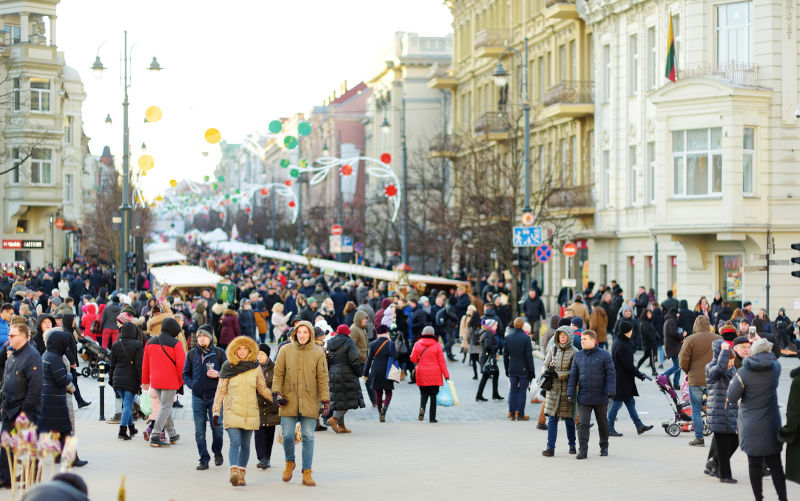Lithuania and Taiwan: "Don't Fight, Don't Win, Don't Surrender"
July 19, 2023
Uzupis, a historic district of Vilnius, Lithuania and a vibrant artistic community, had unilaterally declared its independence from the rest of the country. It adopted three mottoes: “Don’t Fight,” “Don’t Win and Don’t Surrender. These seem particularly apt for the ambiguous status of Taiwan with its anomalous international status and phantasmic national identity.
Lithuania, the venue for the recent NATO meeting, has critical ties with Taiwan and takes an informed interest in East Asian regional affairs. Peter Hartcher, Fairfaxs political international editor, may think that most Australians would struggle to find (Lithuania) on a map, as he wrote this week. If that is true, it reveals a general ignorance in Australia of Asian affairs.
That in turn might be related to recent governments cultivation of ties with Washington and London at the expense of Beijing, Jakarta and our other neighbours. Hartchers cheap diversionary shot was intended to put down Paul Keatings comments about the relevance of NATO to Australias defence and strategic policies. Those of us who care about the importance of our relations with Asian neighbours are well aware of Lithuanias connections in our region.
Lithuania was the first of the three Baltic states to establish non-diplomatic relations with Taiwan in 1997, that is, it maintains official diplomatic relations with the PRC as well as unofficially recognising Taiwan. It opened a trade representative office in Taipei in 2022, similar in status to the Australian Office there. Lithuania was followed by Latvia in 2000 and Estonia in 2002. This followed an unproductive episode in the early 1990s when Latvia attempted to formally recognise both Beijing and Taipei, leading Beijing to freeze relations for a couple of years until Riga renamed the ROC embassy as the Taipei Mission.
Only thirteen countries have full diplomatic relations with Taiwan, including the Vatican. The terms for full recognition are to recognise that it is the sole legitimate government of China, including the mainland and offshore territories. The Solomons switched from Taiwan to the PRC in 2019 and Honduras earlier this year. As Taiwans circle of friends shrinks, its chequebook diplomacy increases, and both Taiwan and the PRC pay particular attention to those countries that are susceptible to change.
China tried hard to cultivate relations with the Baltic states after Latvia faltered in its allegiance, particularly through the 17+1 Initiative that was founded in Budapest in 2012 to expand cooperation between China and EEC member countries. Chinese missions regularly travelled to the Baltic around the time of elections, seeking to promote the benefits of economic and trade ties and to downplay Taiwans potential.
Meanwhile, on the eastern side of Asia, cross-Strait relations had been improving since the election of Kuomintang President Ma Ying-jeou in 2008. The value of Taiwans agricultural exports to the mainland rose 33 percent in the first half of 2011. The number of mainland tourists visiting Taiwan rose from 300,000 in 2008 to over two million in 2012. Discourse regarding cross-Strait relations tended to describe Taiwan as a gateway to the mainland. There were nevertheless counter-currents and Taiwan green party ideology emphasised a distinct Taiwanese identity and favoured de-jure independence.
When I visited Taiwan in 2013, it happened to coincide with the New Taipei City Film Festival and the visit of composer and director Romas Lileikis for the screening of two Lithuanian films, MAAT (2013), and The Shadow of Heaven (2008). The first is a black-and-white film about how understanding grows from tension between teacher and student and between freedom and order. The second concerns the life and legacy of the composer M. K. Ciurlionis (1875-1911), who lived at the time of the birth of the national state of Lithuania, a genius with human failings and faults. Audiences clearly grasped how the people of Taiwan and Lithuania shared the values of independence and pride in their local culture.
Even a decade ago, Lithuanians were wary of Russian political and cultural aggression. Not surprisingly, they have strongly supported Ukraine in the current war. The Russian ambassador was expelled from Vilnius in December 2022 and the Lithuanian ambassador recalled.
Director Romas Lileikis also spoke in Taipei about Uzupis, a historic district of Vilnius, of which he was the self-proclaimed President, that had unilaterally declared its independence from the rest of the country. A vibrant artistic community, it had adopted four flags, and three mottoes: “Don’t Fight,” “Don’t Win and Don’t Surrender. These seemed particularly apt for the ambiguous status of Taiwan with its anomalous international status and phantasmic national identity.
According to Lileikis, the Republic of Uzupis can best be understood by an artist or a dreamer, but each will understand it in his or her own way. Speaking to the Taipei Times, he suggested that Taiwan should, as a nation also not internationally recognised and full of contradictions be open, and to be not afraid of being open.
That is good advice for Lithuania, for Taiwan, and also for Australia. And it has nothing to do with NATO.

